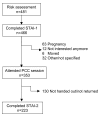GP-initiated preconception counselling in a randomised controlled trial does not induce anxiety
- PMID: 17083722
- PMCID: PMC1664572
- DOI: 10.1186/1471-2296-7-66
GP-initiated preconception counselling in a randomised controlled trial does not induce anxiety
Abstract
Background: Preconception counselling (PCC) can reduce adverse pregnancy outcome by addressing risk factors prior to pregnancy. This study explores whether anxiety is induced in women either by the offer of PCC or by participation with GP-initiated PCC.
Methods: Randomised trial of usual care versus GP-initiated PCC for women aged 18-40, in 54 GP practices in the Netherlands. Women completed the six-item Spielberger State Trait Anxiety Inventory (STAI) before PCC (STAI-1) and after (STAI-2). After pregnancy women completed a STAI focusing on the first trimester of pregnancy (STAI-3).
Results: The mean STAI-1-score (n = 466) was 36.4 (95% CI 35.4-37.3). Following PCC there was an average decrease of 3.6 points in anxiety-levels (95% CI, 2.4-4.8). Mean scores of the STAI-3 were 38.5 (95% CI 37.7-39.3) in the control group (n = 1090) and 38.7 (95% CI 37.9-39.5) in the intervention group (n = 1186).
Conclusion: PCC from one's own GP reduced anxiety after participation, without leading to an increase in anxiety among the intervention group during pregnancy. We therefore conclude that GPs can offer PCC to the general population without fear of causing anxiety.
Figures


Similar articles
-
Preconception counselling initiated by general practitioners in the Netherlands: reaching couples contemplating pregnancy [ISRCTN53942912].BMC Fam Pract. 2006 Jul 7;7:41. doi: 10.1186/1471-2296-7-41. BMC Fam Pract. 2006. PMID: 16824233 Free PMC article.
-
Women's interest in GP-initiated pre-conception counselling in The Netherlands.Fam Pract. 2003 Apr;20(2):142-6. doi: 10.1093/fampra/20.2.142. Fam Pract. 2003. PMID: 12651787
-
Pre-conception counselling in primary care: prevalence of risk factors among couples contemplating pregnancy.Paediatr Perinat Epidemiol. 2008 May;22(3):280-7. doi: 10.1111/j.1365-3016.2008.00930.x. Paediatr Perinat Epidemiol. 2008. PMID: 18426523
-
State-trait anxiety inventory (STAI) scores during pregnancy following intervention with complementary therapies.J Affect Disord. 2012 Dec 15;142(1-3):22-30. doi: 10.1016/j.jad.2012.04.027. Epub 2012 Sep 7. J Affect Disord. 2012. PMID: 22959685 Review.
-
Preconception counseling: rational, practice and challenges.Minerva Ginecol. 2011 Oct;63(5):411-9. Minerva Ginecol. 2011. PMID: 21926950 Review.
Cited by
-
The Edinburgh Postpartum Depression Scale: Stable structure but subscale of limited value to detect anxiety.PLoS One. 2019 Sep 9;14(9):e0221894. doi: 10.1371/journal.pone.0221894. eCollection 2019. PLoS One. 2019. PMID: 31498818 Free PMC article.
-
Psychosocial aspects of preconception consultation in primary care: lessons from our experience in clinical genetics.J Community Genet. 2012 Jul;3(3):213-9. doi: 10.1007/s12687-012-0095-z. Epub 2012 May 15. J Community Genet. 2012. PMID: 22585587 Free PMC article.
-
Couple-based expanded carrier screening provided by general practitioners to couples in the Dutch general population: psychological outcomes and reproductive intentions.Genet Med. 2021 Sep;23(9):1761-1768. doi: 10.1038/s41436-021-01199-6. Epub 2021 Jun 10. Genet Med. 2021. PMID: 34112999 Free PMC article.
-
Preconceptional care: a systematic review of the current situation and recommendations for the future.Facts Views Vis Obgyn. 2013;5(1):13-25. Facts Views Vis Obgyn. 2013. PMID: 24753925 Free PMC article.
-
A systematic review of the effect of reproductive intention screening in primary care settings on reproductive health outcomes.Fam Pract. 2018 Mar 27;35(2):122-131. doi: 10.1093/fampra/cmx086. Fam Pract. 2018. PMID: 28973668 Free PMC article.
References
-
- Grubbs S, Brundage SC. Preconception management of chronic diseases. J S C Med Assoc. 2002;98:270–276. - PubMed
-
- Braithwaite D, Emery J, Walter F, Prevost AT, Sutton S. Psychological impact of genetic counseling for familial cancer: a systematic review and meta-analysis. J Natl Cancer Inst. 2004;96:122–133. - PubMed
Publication types
MeSH terms
Associated data
LinkOut - more resources
Full Text Sources
Medical

